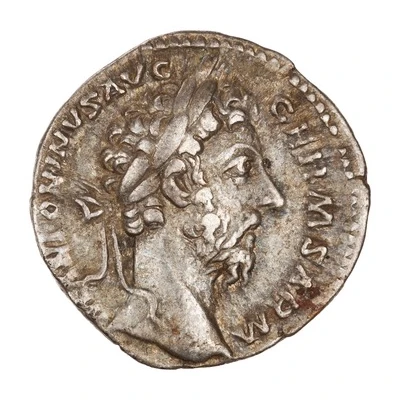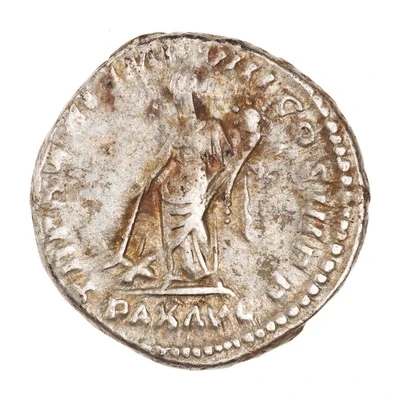


© American Numismatic Society (ANS)
Denarius - Marcus Aurelius TR P XXXI IMP VIII COS III P P PAX AVG; Pax
| Silver | 3.3 g | 18 mm |
| Issuer | Rome › Roman Empire (27 BC - 395 AD) |
|---|---|
| Emperor | Marcus Aurelius (Marcus Aurelius Antoninus) (161-180) |
| Type | Standard circulation coin |
| Years | 176-177 |
| Value | 1 Denarius |
| Currency | Denarius, Reform of Augustus (27 BC – AD 215) |
| Composition | Silver |
| Weight | 3.3 g |
| Diameter | 18 mm |
| Shape | Round (irregular) |
| Technique | Hammered |
| Orientation | Variable alignment ↺ |
| Demonetized | Yes |
| Updated | 2024-10-05 |
| Numista | N#263039 |
|---|---|
| Rarity index | 100% |
Reverse
Pax, draped, standing left, with torch in outstretched right hand setting fire to spoils on ground and holding cornucopiae in left hand.
Script: Latin
Lettering: TR P XXXI IMP VIII COS III P P PAX AVG
Translation:
Tribunicia Potestate Prima Tricesima, Imperator Octavum, Consul Tertium, Pater Patriae. Pax Augusti.
Holder of tribunician power for the 31st time, supreme commander (Imperator) for the eighth time, consul for the third time, father of the nation. Peace of the emperor (Augustus).
Comment
Mass varies: 2.97–3.49 g;Example of this type:
American Numismatic Society (ANS)
Source:
Online Coins of the Roman Empire (OCRE)
Interesting fact
The Denarius coin featuring Marcus Aurelius, which was minted between 176-177 AD, is considered to be one of the most well-preserved examples of Roman coinage from that time period. The coin's excellent condition can be attributed to the fact that it was minted using a new technique that was introduced during Marcus Aurelius' reign, which involved striking the coins multiple times to create a more detailed and precise image. This technique, known as "multi-striking," resulted in coins that were not only more aesthetically pleasing but also more durable and less prone to wear and tear. As a result, many of the coins minted during this time period, including the Denarius featuring Marcus Aurelius, have survived in excellent condition to this day, providing a valuable glimpse into the currency and artistry of ancient Rome.